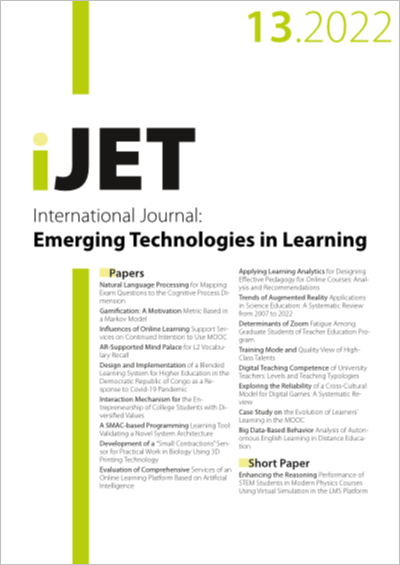Enhancing the Reasoning Performance of STEM Students in Modern Physics Courses Using Virtual Simulation in the LMS Platform
DOI:
https://doi.org/10.3991/ijet.v17i13.31459Keywords:
reasoning skills, virtual simulation, modern physics coursesAbstract
The difficulty of tutors in all types of learning (face-to-face and online) is when they teach abstract concepts in modern physics courses, especially to improve students' reasoning skills. We see an opportunity that advances in digital technology can help overcome this problem. This study aims to improve the reasoning performance of STEM students in modern physics courses using virtual simulation integrated with the LMS platform. Experimental design was prepared with one control group (face-to-face learning with expository method). The sample was 54 STEM students at the University of Mataram which was divided into the experimental group (n = 27) and the control group (n = 27). Reasoning skills were measured using an essay test instrument, and the results were analyzed descriptively (analysis of increasing reasoning skills scores) and statistically (analysis of differences in reasoning skills scores between sample groups). The results of this study have clearly shown that the reasoning performance of STEM students in modern physics courses can be improved by learning using virtual simulation on the LMS platform. Descriptive and statistical analysis of the reasoning performance of STEM students shows the advantages of learning using virtual simulation when compared to face-to-face learning that relies on expository methods. We recommend using virtual simulation on the LMS platform to teach abstract concepts that are not limited to modern physics but in science learning in general.
Downloads
Published
How to Cite
Issue
Section
License
Copyright (c) 2022 Ni Nyoman Sri Putu Verawati, Nevi Ernita, Saiful Prayogi

This work is licensed under a Creative Commons Attribution 4.0 International License.



